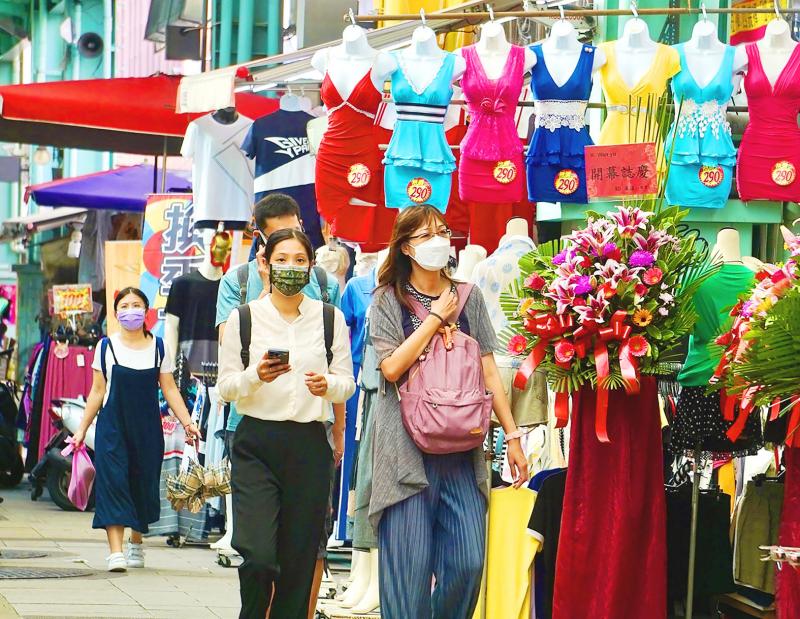Taiwan’s business climate monitor last month flashed “green” for a fourth straight month, indicating steady growth, although the economy lost further momentum, the National Development Council said yesterday.
The total score of the nine constituent readings lost one point, dropping to 27 due to weakening industrial production and money supply data, the council said.
“The pace of slowdown became more evident [last month], but it is premature to interpret the trend as an economic turnaround,” council research director Wu Ming-huei (吳明蕙) said.

Photo: CNA
The council uses a five-color system to indicate the state of the nation’s economy, with “green” meaning steady growth, “red” suggesting a boom and “blue” signaling a recession. Dual colors indicate a shift to a stronger or weaker state.
International research bodies have in the past month trimmed their forecast for global GDP growth, citing Russia’s invasion of Ukraine, inflation and monetary tightening, Wu said.
Rising energy and commodity costs, as well as other financial burdens, have squeezed consumer spending for nonessential items and caused local manufacturers to become increasingly conservative about their business outlook, she said.
The index of leading indicators, which seeks to predict the economic situation in the coming six months, fell 1.27 percent to 97.26, the council said, as almost all sub-indices posted negative cyclical movements except the reading on semiconductor equipment imports.
The index of coincident indicators, which reflects the current economic situation, lost 0.76 percent to 99.69, as all sub-indices declined from one month earlier, it said.
There is little Taiwan can do to reverse unfavorable external developments, but the government has introduced new stimulus measures to shore up domestic demand and ease inflationary pressures, Wu said.
Against that backdrop, financial markets might become increasingly volatile, but the business climate for service providers might improve soon on a stabilizing COVID-19 situation, she added.
There is a high chance that the climate monitor will continue to flash “green” throughout the second half of this year, she said.

NEW IDENTITY: Known for its software, India has expanded into hardware, with its semiconductor industry growing from US$38bn in 2023 to US$45bn to US$50bn India on Saturday inaugurated its first semiconductor assembly and test facility, a milestone in the government’s push to reduce dependence on foreign chipmakers and stake a claim in a sector dominated by China. Indian Prime Minister Narendra Modi opened US firm Micron Technology Inc’s semiconductor assembly, test and packaging unit in his home state of Gujarat, hailing the “dawn of a new era” for India’s technology ambitions. “When young Indians look back in the future, they will see this decade as the turning point in our tech future,” Modi told the event, which was broadcast on his YouTube channel. The plant would convert

‘SEISMIC SHIFT’: The researcher forecast there would be about 1.1 billion mobile shipments this year, down from 1.26 billion the prior year and erasing years of gains The global smartphone market is expected to contract 12.9 percent this year due to the unprecedented memorychip shortage, marking “a crisis like no other,” researcher International Data Corp (IDC) said. The new forecast, a dramatic revision down from earlier estimates, gives the latest accounting of the ongoing memory crunch that is affecting every corner of the electronics industry. The demand for advanced memory to power artificial intelligence (AI) tasks has drained global supply until well into next year and jeopardizes the business model of many smartphone makers. IDC forecast about 1.1 billion mobile shipments this year, down from 1.26 billion the prior

People stand in a Pokemon store in Tokyo on Thursday. One of the world highest-grossing franchises is celebrated its 30th anniversary yesterday.

Zimbabwe’s ban on raw lithium exports is forcing Chinese miners to rethink their strategy, speeding up plans to process the metal locally instead of shipping it to China’s vast rechargeable battery industry. The country is Africa’s largest lithium producer and has one of the world’s largest reserves, according to the US Geological Survey (USGS). Zimbabwe already banned the export of lithium ore in 2022 and last year announced it would halt exports of lithium concentrates from January next year. However, on Wednesday it imposed the ban with immediate effect, leaving unclear what the lithium mining sector would do in the